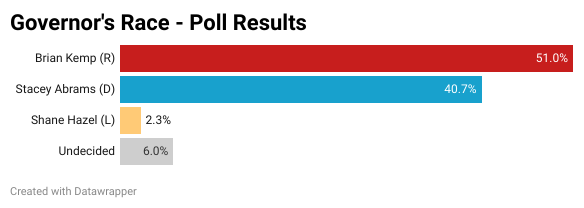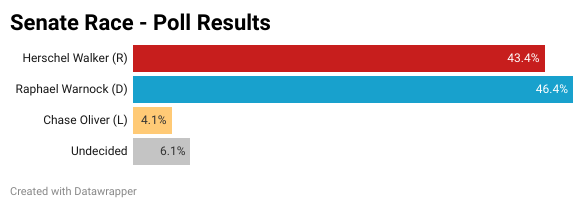
ATLANTA – Republican Gov. Brian Kemp has opened a double-digit lead over Democratic challenger Stacey Abrams, according to a poll released Wednesday.
However, Georgia’s U.S. Senate race is in a dead heat, the Capitol Beat/Georgia News Collaborative Poll found in a survey of 1,030 likely general election voters conducted Sept. 15-Oct. 4 by the University of Georgia’s School of Public and International Affairs.
The survey found state Sen. Burt Jones, R-Jackson, with a slight lead for the open lieutenant governor’s seat over Democrat Charlie Bailey.
GOP incumbents hold a solid lead in both the races for attorney general and secretary of state, according to the poll.
Kemp drew the support of 51% of poll respondents to 40.7% for Abrams, giving the governor a lead of 10.3%. Libertarian Shane Hazel was a distant third with 2.3%, while 6% of those surveyed were undecided.
Sen. Raphael Warnock, D-Ga., was favored by 46.4% of the poll respondents, to 43.4% for Republican challenger Herschel Walker. Given the poll’s margin of error of 3.1 percentage points, the race is essentially tied. Chase Oliver, the Libertarian candidate, trailed at 4.1%, while 6.1% of those surveyed were undecided.

Support for Jones stood at 43.5%, with 38.8% of survey respondents favoring Bailey. Factoring in the margin of error left Jones with a slight lead over his Democratic rival for lieutenant governor. Libertarian Ryan Graham was third at 4.0%, and 13.8% of respondents were undecided.
While Kemp polled slightly above the 50%-plus-one margin needed to avoid a Dec. 6 runoff, the race for Senate and possibly the contest for lieutenant governor could be headed toward an extra round of voting.
The survey found Republican Secretary of State Brad Raffensperger well ahead of state Rep. Bee Nguyen, 47.9% to 33.9%. Libertarian Ted Metz stood third at 6.3%, with 11.8% undecided.
Likewise, GOP Attorney General Chris Carr held a strong lead over Democratic state Sen. Jen Jordan, 47.4% to 38.8%. Libertarian Martin Cowen trailed at 3.6%, with 10.2% undecided.
Although both Raffensperger and Carr were short of the margin needed to win the Nov. 8 election outright, the large percentage of undecided voters left room for the two incumbents to get over the threshold.
Kemp’s lead over Abrams in the gubernatorial contest has widened over recent polls.
“I think he’s done a good job,” said Misty Dunn, 45, an archaeologist from Meriwether County, a regular Republican voter who supports Kemp even though she disagrees with his staunch opposition to abortion.
“I can’t vote the other way on that one issue,” Dunn said.
Aaron Williams, 42 of McDonough, who works for a telecommunications company, said he plans to vote for Abrams primarily because she is not a Republican, a party he has soured on.
“The conservative side has gone full on hypocrisy,” Williams said. “I can’t get behind a single conservative candidate.”
Wendy Meehan, 72, of Madison County, said she will vote to elect Warnock to a full Senate term because her positions in favor of Medicaid expansion and against the U.S. Supreme Court decision overturning the constitutional right to abortion align with the Democrats.
Meehan said she doesn’t believe Walker is qualified to serve in the Senate.
“He should not be a Senate candidate,” she said. “Georgia could do much better than him.”
Lisa Elias, 53, a business owner from Gainesville, said she liked Walker when she saw him speak at her church.
“He seemed like a good man,” Elias said. “I’m a Christian, and I’m conservative in my values.”
But some Republican voters are starting to have concerns about Walker following allegations of violence against his ex-wife and that he paid for a former girlfriend’s abortion.
“If these things are true, that’s horrible,” said Sarah Simcox, 56, a kindergarten teacher in Forsyth County. “But I think politically he might be better [than Warnock]. … I’m struggling with it. It’s going to take a lot of prayer.”
Black voters who responded to the poll overwhelmingly preferred Democrats Abrams and Warnock, not surprising since most Black voters support Democratic candidates. But Warnock outperformed Abrams among that group of voters, 89% to 80.7%.
Walker, a former University of Georgia football star, drew only 2% support among Black voters, while Kemp was preferred by 8% of Black survey respondents.
Kemp held a solid lead over Abrams among men, 58% to 33.3%. Walker’s lead among men was strong but not as large as Kemp’s. Walker was supported by 52.5% of men who responded to the poll, compared to 37.7% favoring Warnock.
Warnock, however, enjoyed a huge lead among women, 53.6% to 36.3% for Walker. Women were much more evenly divided in the governor’s race, with 46.6% preferring Abrams to 45.4% supporting Kemp.
Broken down by age, Kemp held the edge among all groups except for those between the ages of 30 and 44. Among that group, Abrams led 50.6% to 39%.
Warnock led decisively among younger voters, those between the ages of 18 and 44. Walker turned the tables with a solid lead among the 45-64 age group and a smaller lead among voters 65 and older.
Kemp polled strongest among voters with a high school education or less, while Abrams’ biggest advantage was among college graduates.
The same was true in the Senate race, with Walker scoring highest among those with a high school diploma or less, and Warnock’s best showing coming from poll respondents with a college degree.
The poll was conducted via telephone, about 90% through cellphone interviews and 10% over landline connections.
The survey results were weighted to represent respondents proportionally in terms of race, sex, age, and education.
Staff writer Rebecca Grapevine contributed to this report.
This story is available through a news partnership with Capitol Beat News Service, a project of the Georgia Press Educational Foundation.